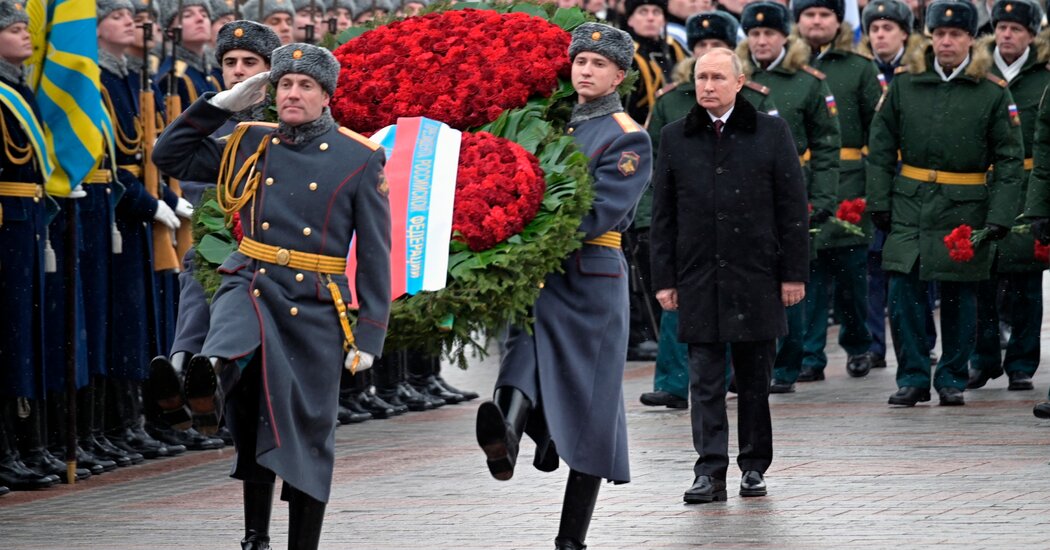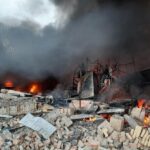
MOSCOW — Russians thought they knew their president.
They were wrong.
And by Thursday, it appeared too late to do anything about it.
For most of his 22-year rule, Vladimir V. Putin presented an aura of calm determination at home — of an ability to astutely manage risk to navigate the world’s biggest country through treacherous shoals. His attack on Ukraine negated that image, and revealed him as an altogether different leader: one dragging the nuclear superpower he helms into a war with no foreseeable conclusion, one that by all appearances will end Russia’s attempts over its three post-Soviet decades to find a place in a peaceful world order.
Russians awoke in shock after they learned that Mr. Putin, in an address to the nation that aired before 6 a.m., had ordered a full-scale assault against what Russians of all political stripes often refer to as their “brotherly nation.” Liberal-leaning public figures who for years tried to compromise with and adapt to Mr. Putin’s creeping authoritarianism found themselves reduced to posting on social media about their opposition to a war they had no way to stop.
And in Moscow’s foreign policy establishment, where analysts overwhelmingly characterized Mr. Putin’s military buildup around Ukraine as an elaborate and astute bluff in recent months, admitted on Thursday that they had monumentally misjudged a man they had spent decades studying.
“Everything that we believed turned out to be wrong,” said one such analyst, insisting on anonymity because he was at a loss over what to say.
“I don’t understand the motivations, the goals or the possible results,” said another. “What is happening is very strange.”
“I’ve always tried to understand Putin,” a third analyst, Tatiana Stanovaya of the political analysis firm R. Politik, reflected. But now, she said, the usefulness of logic seemed at a limit. “He has become less pragmatic, and more emotional.”
On state television, Mr. Putin’s most powerful propaganda tool, the Kremlin tried to project an air of normalcy. The state-run news media characterized Thursday’s invasion as not a war, but a “special military operation” limited to eastern Ukraine. Mr. Putin was shown meeting with the visiting prime minister of Pakistan, Imran Khan, as though he were still shrewdly carrying on his day-to-day business.
“This is not the beginning of a war,” Maria V. Zakharova, the foreign ministry’s spokeswoman, said on television. “Our desire is to prevent developments that could escalate into a global war.”
Meanwhile, Russia’s stock market plummeted by 35 percent and A.T.M.s ran short of dollars. On the country’s internet, still mostly uncensored, Russians saw their vaunted military sow carnage in a country in which millions of them had relatives and friends.
Many of them had bought into the Kremlin’s narrative that theirs was a peace-loving country, and Mr. Putin a careful and calculating leader. After all, many Russians still believe, it was Mr. Putin who lifted their country out of the poverty and chaos of the 1990s and made it into a place with a decent standard of living and worthy of international respect.
“It’s so strange that Russia could attack anyone,” a 60-year-old pensioner said on Thursday as she walked through the breathtaking Moscow park, Zaryadye, that international architects designed ahead of the soccer World Cup Russia hosted in 2018. “This has never happened before in history.”
Like many on Thursday, she declined to reveal her name in the fear that the outbreak of war could bring with it a new crackdown on people’s freedoms.
One of the country’s ever-dwindling number of rights activists, Marina Litvinovich, called for an antiwar protest to be held in Moscow on Thursday evening, and was promptly arrested. Police buses and riot police descended on Pushkin Square, where she had urged people to gather. An actor posted a directive from his state-run Moscow theater claiming that “any negative commentary” about the war would be seen by the authorities as “treason.”
In the last three months, as American officials warned that Mr. Putin’s troop buildup was a prelude to an invasion, Russians dismissed such talk as a Western failure to understand their president’s fundamental determination to manage risk and avoid rash moves with unpredictable consequences. And with leading opposition figures imprisoned or exiled, there were few figures with the influence to organize an antiwar movement.
Some public figures with ties to the government reversed course, though they recognized it was too late. Ivan Urgant, the most prominent late-night comedian on state television, had ridiculed the idea of a looming war on his show earlier this month. On Thursday he posted a black square on Instagram along with the words: “Fear and pain.”
Ksenia Sobchak, another television celebrity whose father was mayor of St. Petersburg and a 1990s mentor to Mr. Putin, posted on Instagram that from now on she would only “believe in the worst possible scenarios” about her country’s future. Days earlier, she had praised Mr. Putin as a “grown-up, adequate politician” compared to his Ukrainian and American counterparts.
“We are now all trapped in this situation,” she wrote on Thursday. “There is no exit. We Russians will spend many years digging out from the consequences of this day.”
During the pandemic, analysts had noticed a change in Mr. Putin — a man who isolated himself in a bubble of social distancing without parallel among Western leaders. In isolation, he appeared to become more aggrieved and more emotional, and increasingly spoke about his mission in stark historical terms. His public remarks descended ever deeper into distorted historiography as he spoke of the need to right perceived historical wrongs suffered by Russia over the centuries at the hands of the West.
Russia’s Attack on Ukraine and the Global Economy
A rising concern. Russia’s attack on Ukraine could cause dizzying spikes in prices for energy and food and could spook investors. The economic damage from supply disruptions and economic sanctions would be severe in some countries and industries and unnoticed in others.
The political scientist Gleb O. Pavlovsky, a close adviser to Mr. Putin until falling out with him in 2011, said he was stunned by the president’s dark description of Ukraine as a dire threat to Russia in his hourlong speech to the nation on Monday.
“I have no clue where he got all that — he seems to be reading something totally strange,” Mr. Pavlovsky said. “He’s become an isolated man, more isolated than Stalin was.”
Ms. Stanovaya, the analyst, said she now felt that Mr. Putin’s heightened obsession with history in recent years had become key to understanding his motivation. After all, the war against Ukraine appeared impossible to explain strategically, since it had no clear resolution and would inevitably only increase anti-Russian sentiment abroad and escalate Russia’s confrontation with the NATO alliance.
“Putin has brought himself to a place in which he sees it as more important, more interesting, more compelling to fight for restoring historical justice than for Russia’s strategic priorities,” Ms. Stanovaya said. “This morning, I realized that a certain shift has taken place.”
She said that by all appearances, the ruling elite around Mr. Putin did not realize that Thursday’s war was coming, and was uncertain about how to respond. Beyond state television personalities and pro-Kremlin politicians, few prominent Russians spoke out in support of the war.
But that, she said, did not mean that Mr. Putin risked any kind of palace coup, given his tight hold on the country’s sprawling security apparatus and his expansive crackdown on dissent over the last year.
“He can still act for a long time,” Ms. Stanovaya said. “Inside Russia, he is practically secure from political risk.”
Alina Lobzina and Oleg Matsnev contributed reporting from Moscow, and Ivan Nechepurenko from Rostov-on-Don, Russia.




